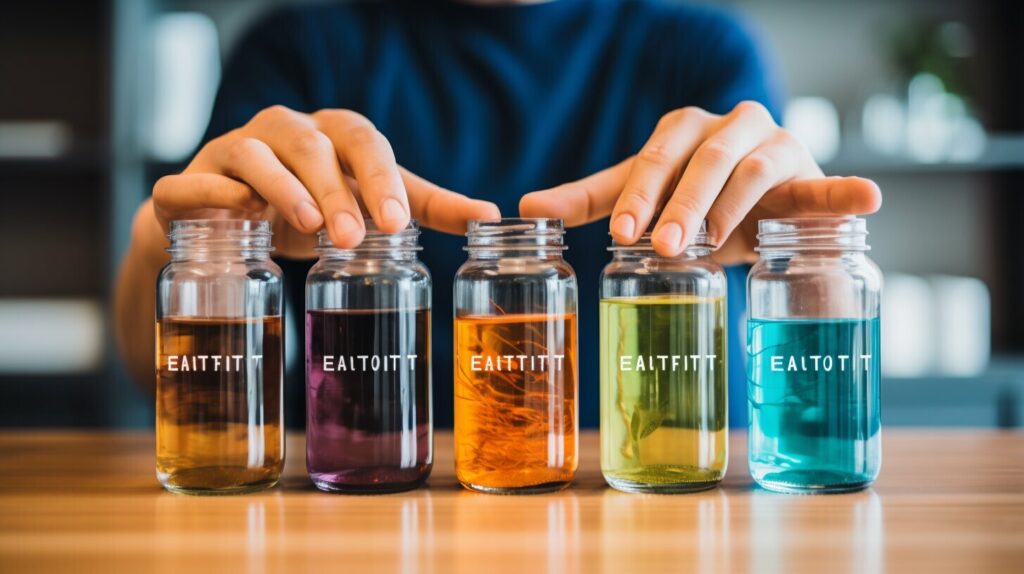Water fasting can have numerous health benefits, but it’s important to understand whether you need to supplement your fast, and if so, which supplements are best. The decision to use supplements during fasting depends on the type and duration of your fast. Short-term fasting, such as intermittent fasting, may not require supplementation, while extended fasting of 48 hours or more will require electrolytes. It’s crucial to consider the specific needs of your body and the duration of your fast when determining whether to use water fasting supplements.
Key Takeaways:
- Water fasting supplements may be necessary for extended fasts of 48 hours or more.
- Intermittent fasting and short-term extended fasting generally do not require special supplementation.
- Electrolyte depletion can occur during alternate day fasting, so pay attention to symptoms and consider supplementation accordingly.
- Supplementing with electrolytes, such as sodium, chloride, potassium, and magnesium, is essential during extended fasting to prevent deficiency symptoms.
- Individual electrolyte requirements during extended fasting can vary, so it’s important to adjust supplementation based on personal factors.
Do you need supplements for intermittent fasting?
Intermittent fasting is a popular fasting method that involves alternating periods of eating and fasting. Unlike extended fasting, which lasts for 48 hours or longer, intermittent fasting typically requires no special supplementation. However, there are certain supplements that can support the fasting process and make it easier to adhere to the fasting window.
One factor to consider is the level of physical activity during the fasting period. Intense exercise sessions can deplete electrolytes, such as sodium, potassium, and magnesium, which are essential for proper bodily function. In such cases, it may be beneficial to replenish these electrolytes with supplementation.
Additionally, if you already take generic well-being supplements, it is generally recommended to continue taking them during your refeed meal rather than during the fasting window. This ensures that your body still receives the necessary nutrients while allowing the fasting period to remain uninterrupted.
Supplements for intermittent fasting
| Supplement | Purpose |
|---|---|
| Electrolyte supplements | Help replenish electrolytes lost during exercise or extended fasting |
| Generic well-being supplements | Continue taking during refeed meal instead of the fasting window |
Overall, intermittent fasting typically does not require specific supplementation, but certain supplements can provide support during the fasting process. It is important to listen to your body and consult with a healthcare professional to determine the best approach for your individual needs.

Supplements for Alternate Day Fasting
Alternate day fasting is a popular fasting method that involves fasting for a whole day followed by a refeed day. While this type of fasting is unlikely to lead to vitamin deficiencies, it’s important to be mindful of electrolyte levels during the fasting window. Electrolytes such as sodium, potassium, chloride, and magnesium play a crucial role in maintaining proper body function.
To ensure your electrolyte levels stay balanced during alternate day fasting, it may be necessary to consider supplementation. If you experience symptoms of electrolyte deficiency, such as muscle cramps, fatigue, or irregular heartbeat, it may be a sign that supplementation is needed. Electrolyte supplements can help replenish the electrolytes that are typically obtained from food.
When considering alternate day fasting supplements, it’s important to consult with a healthcare professional to determine the best options for your individual needs. They can help identify any specific deficiencies or imbalances that may require targeted supplementation. Additionally, monitoring your body’s response to fasting and understanding how it affects your electrolyte levels can help guide your supplementation strategy.
Supplements for Alternate Day Fasting
| Supplement | Benefits | Recommended Dosage |
|---|---|---|
| Sodium | Aids in fluid balance and nerve function | 1,500-2,300 mg per day |
| Potassium | Supports heart health and muscle function | 2,600-3,400 mg per day |
| Chloride | Assists with digestion and pH balance | 2,300-3,400 mg per day |
| Magnesium | Plays a role in energy production and muscle function | 310-420 mg per day for women, 400-420 mg per day for men |
Remember, the ideal supplementation strategy for alternate day fasting may vary depending on individual factors such as age, sex, activity level, and overall health. It’s always best to seek guidance from a healthcare professional to ensure you are meeting your body’s specific needs.

Supplements for Extended Fasting
Extended fasting of more than 48 hours requires special attention to ensure that your body receives the necessary nutrients during this time. Supplementing with electrolytes is crucial to prevent symptoms of deficiency and support your overall well-being. Electrolytes, such as sodium, chloride, potassium, and magnesium, are essential for the normal functioning of your body.

During fasting, the electrolytes that you would typically get from food become unavailable, and your body’s reserves can deplete quickly. This can lead to symptoms such as headaches, fatigue, irregular heartbeat, muscle cramps, and nausea. Therefore, it is important to replenish these electrolytes through supplementation.
Supplements for Extended Fasting – Benefits and Recommendations
To ensure that you are adequately supplementing with electrolytes during extended fasting, consider the following:
- Choose electrolyte supplements that contain sodium, chloride, potassium, and magnesium.
- Follow the recommended dosages provided by the manufacturer or consult with a healthcare professional for personalized recommendations.
- Monitor your body for any symptoms of electrolyte deficiency and adjust your supplementation accordingly.
By taking these precautions and properly supplementing with electrolytes, you can support your body’s needs during extended fasting and minimize the risk of electrolyte imbalances and related symptoms.
| Electrolyte | Recommended Daily Intake | Food Sources |
|---|---|---|
| Sodium | 2,300 milligrams (mg) | Table salt, sea salt, pickles, olives |
| Chloride | 2,300 mg | Table salt, sea salt, celery, tomatoes |
| Potassium | 4,700 mg | Bananas, avocados, spinach, mushrooms |
| Magnesium | 400-420 mg for men, 310-320 mg for women | Almonds, spinach, pumpkin seeds, dark chocolate |
Remember, extended fasting can have a significant impact on your body, so it’s important to listen to your body’s needs and consult with a healthcare professional before starting any fasting regimen or making changes to your supplementation routine.
Summary
Extended fasting of more than 48 hours requires supplementation with electrolytes to prevent deficiencies and support overall well-being. Sodium, chloride, potassium, and magnesium are essential electrolytes that your body needs for normal functioning. By choosing the right supplements and monitoring your body’s needs, you can ensure that you are adequately supporting your body during extended fasting.
Key Electrolytes to Supplement During Extended Fasting
During extended fasting, it is crucial to supplement key electrolytes to maintain proper bodily functions. Electrolytes such as sodium, chloride, potassium, and magnesium play essential roles in nerve function, muscle contraction, and maintaining fluid balance in the body. However, these electrolytes can quickly deplete during fasting, leading to symptoms of deficiency.
Table: Key Electrolytes for Fasting
| Electrolyte | Function | Food Sources | Recommended Daily Intake |
|---|---|---|---|
| Sodium | Regulates fluid balance, nerve function, and muscle contractions | Table salt, soy sauce, processed foods | 2,300 mg |
| Chloride | Aids in fluid balance, digestion, and nervous system function | Salt, seaweed, olives, celery, tomatoes | 2,300 mg |
| Potassium | Supports muscle contractions, nerve function, and heart health | Bananas, oranges, avocados, spinach, broccoli | 4,700 mg |
| Magnesium | Required for energy production, muscle function, and bone health | Pumpkin seeds, almonds, spinach, black beans | 400-420 mg (males), 310-320 mg (females) |
Ensuring an adequate intake of these electrolytes can help prevent symptoms such as muscle cramps, fatigue, dizziness, and irregular heartbeat. To supplement these electrolytes during extended fasting, individuals can include a combination of sodium-rich foods, such as standard table salt or Himalayan pink salt, along with other food sources rich in chloride, potassium, and magnesium.
It’s important to note that the recommended daily intake values mentioned in the table may vary depending on individual needs, medical conditions, and other factors. Consulting with a healthcare professional can help determine the appropriate dosage of these electrolytes for a specific fasting regimen.

Determining the Optimal Level of Electrolytes During Extended Fasting
When embarking on an extended fast, it is crucial to ensure that your body is receiving the necessary electrolytes to maintain proper functioning. Electrolytes such as sodium, chloride, potassium, and magnesium are essential for various bodily processes, including nerve function, muscle contraction, and maintaining fluid balance.
The optimal level of electrolytes during extended fasting can vary depending on several factors. The duration of your fast, your body build and composition, exercise levels, medical conditions, and medications all play a role in determining your individual electrolyte requirements. It is recommended to start with the recommended daily values and adjust based on personal factors.
To maintain electrolyte balance during extended fasting, it is important to consider supplementing with these key electrolytes. Sodium and chloride can be fulfilled through standard table salt or variations like Himalayan pink salt. Potassium can be obtained through foods such as avocados, spinach, and mushrooms. Magnesium can be found in foods like dark chocolate, almonds, and spinach.
Table: Recommended Daily Intake of Electrolytes During Extended Fasting
| Electrolyte | Recommended Daily Intake |
|---|---|
| Sodium | 2,300 – 2,500 mg |
| Chloride | 2,300 – 2,500 mg |
| Potassium | 2,600 – 3,400 mg |
| Magnesium | 310 – 420 mg |
It is important to note that individual electrolyte requirements may fluctuate day-by-day and can vary significantly among individuals. Monitoring your body’s response and adjusting your electrolyte intake accordingly is crucial for maintaining optimal health during extended fasting.

Do you need a multivitamin during fasting?
While fasting, most people do not need to take multivitamins. The body stores fat-soluble vitamins, such as vitamins A, D, E, and K, in its fat tissues, allowing access to these vitamins during a fast. Water-soluble vitamins, like B and C, function differently and require less intake during fasting. However, individuals with pre-existing deficiencies or experiencing symptoms of deficiency may consider taking a multivitamin during their fast to ensure their nutritional needs are met.
It’s important to note that fasting can lead to changes in the body’s nutrient requirements. For example, fasting may increase the body’s need for certain minerals, such as magnesium and potassium. While these minerals can be obtained through food sources, individuals with limited access to specific nutrient-rich foods may benefit from supplementing with a multivitamin during fasting.
When considering whether to take a multivitamin during fasting, it’s recommended to consult with a healthcare professional. They can assess your individual nutritional needs, evaluate any existing deficiencies, and provide guidance on whether a multivitamin is necessary for your fasting routine.
Key Takeaways:
- Fasting generally does not require multivitamin supplementation as the body can access stored fat-soluble vitamins during a fast.
- Water-soluble vitamins have a different metabolic process and may require less intake during fasting.
- Individuals with pre-existing deficiencies or experiencing symptoms of deficiency may consider taking a multivitamin during fasting to ensure nutritional needs are met.
- Consulting with a healthcare professional is recommended to determine if multivitamin supplementation is necessary for your fasting routine.

Supplements for the Refeed Phase After Extended Fasting
After completing an extended fast of 14 days or more, the refeed phase becomes crucial for replenishing nutrients and transitioning back to regular eating. While it’s important to focus on whole, nutrient-dense foods during this phase, additional supplements can support the body’s recovery and help optimize your transition. Here are some key supplements to consider:
Phosphorus
Phosphorus is an essential mineral that plays a critical role in various bodily functions, including bone health, energy production, and nutrient metabolism. During an extended fast, phosphorus levels may become depleted. Taking a phosphorus supplement before breaking your fast can help replenish these levels and support overall health.
B Vitamin Complex
B vitamins are involved in numerous biological processes and are crucial for energy production, brain function, and red blood cell production. During an extended fast, the body’s stores of B vitamins may become depleted. Taking a B vitamin complex supplement can ensure adequate levels of these essential nutrients and support overall well-being during the refeed phase.

Electrolytes
While electrolyte supplementation is important throughout the fasting process, it remains essential during the refeed phase. As the body transitions back to regular eating, electrolytes like sodium, chloride, potassium, and magnesium help maintain proper hydration, muscle function, and nerve signaling. Continuing to supplement with electrolytes in smaller dosages for several days after the end of your fast can support a smooth transition and prevent any potential imbalances or deficiencies.
It’s important to note that these supplements should be taken in conjunction with a healthy and balanced refeed meal plan. Consult with a healthcare professional or registered dietitian to determine the appropriate dosage and duration for these supplements based on your individual needs and health status.
| Supplement | Benefit |
|---|---|
| Phosphorus | Supports bone health, energy production, and nutrient metabolism |
| B Vitamin Complex | Aids in energy production, brain function, and red blood cell production |
| Electrolytes | Maintains hydration, muscle function, and nerve signaling |
Can supplements disrupt your fast or support fasting?
When it comes to fasting, the use of supplements can be a topic of debate. Some supplements can disrupt a fast by breaking the fast or spiking insulin levels, while others can actually support the fasting process. It’s important to understand which supplements are suitable for a fasted state and which are best taken with food.
Creatine, electrolytes, L-tyrosine, probiotics, and certain water-soluble vitamins are examples of supplements that can be taken while fasting. These supplements typically do not contain calories or significant amounts of carbohydrates, making them compatible with fasting. They can help support energy levels, maintain electrolyte balance, and promote overall well-being during the fasting period.
On the other hand, amino acids, curcumin, omega-3 fatty acids, fat-soluble vitamins, and protein powder are better absorbed with food and should be taken during the eating window. These supplements often contain calories or macronutrients that can break the fast and stimulate the digestive system. By consuming them during the feeding window, their benefits can be maximized without interfering with the fasting state.
“It’s important to determine which supplements are suitable for a fasted state and which are best taken with food.”
When deciding which supplements to incorporate into your fasting routine, it’s important to listen to your body and consider your specific fasting goals. Additionally, consulting with a healthcare professional can provide personalized guidance based on your individual needs and medical history. By choosing the right supplements for your fast, you can optimize the benefits of fasting while supporting your overall health and well-being.

Table: Supplements and their compatibility with fasting
| Supplement | Compatibility with Fasting |
|---|---|
| Creatine | Can be taken while fasting |
| Electrolytes | Can be taken while fasting |
| L-tyrosine | Can be taken while fasting |
| Probiotics | Can be taken while fasting |
| Water-soluble vitamins | Can be taken while fasting |
| Amino acids | Best taken with food |
| Curcumin | Best taken with food |
| Omega-3 fatty acids | Best taken with food |
| Fat-soluble vitamins | Best taken with food |
| Protein powder | Best taken with food |
Conclusion
In conclusion, water fasting supplements can provide numerous benefits for individuals practicing intermittent fasting or extended fasting. By incorporating effective water fasting supplements into your fasting routine, you can optimize your fast and support overall health and well-being.
It is important to note that not all supplements are suitable for a fasted state. Some supplements, such as creatine, electrolytes, L-tyrosine, probiotics, and certain water-soluble vitamins, can be taken while fasting. On the other hand, supplements like amino acids, curcumin, omega-3 fatty acids, fat-soluble vitamins, and protein powder are better absorbed with food and should be taken during the eating window.
Before incorporating water fasting supplements into your fasting routine, it is crucial to listen to your body and consult with a healthcare professional. They can provide personalized guidance based on your specific fasting goals and medical history.
By choosing the top water fasting supplements and properly supplementing during your fast, you can enhance the effectiveness of your fast, support your body’s nutritional needs, and promote overall well-being.
FAQ
Do I need to take supplements for intermittent fasting?
Intermittent fasting typically does not require special supplementation. However, if you engage in heavy exercise during the fasting window or already take generic well-being supplements, it’s best to continue taking them with your refeed meal rather than during the fasting window.
What supplements should I take for alternate day fasting?
Alternate day fasting may not lead to vitamin deficiencies, but electrolyte depletion can occur due to the longer fasting window. Pay attention to symptoms of electrolyte deficiency and consider supplementing accordingly.
What supplements should I take for extended fasting?
Extended fasting of more than 48 hours will require supplementing with electrolytes to prevent symptoms of deficiency, such as headaches, fatigue, irregular heartbeat, muscle cramps, and nausea.
Which key electrolytes should I supplement during extended fasting?
The key electrolytes to supplement during extended fasting include sodium, chloride, potassium, and magnesium. These electrolytes are essential for normal body functioning.
How do I determine the optimal level of electrolytes during extended fasting?
The optimal level of electrolytes during extended fasting varies based on factors such as the duration of the fast, your body build and composition, exercise levels, medical conditions, and medications. It is recommended to start with recommended daily values and adjust based on personal factors.
Do I need to take a multivitamin during fasting?
Most people do not need to take multivitamins during fasting. Fat-soluble vitamins, such as A, D, E, and K, can be accessed from the body’s fat tissues. Water-soluble vitamins, like B and C, require less intake during fasting as their processes work differently. However, individuals with pre-existing deficiencies or experiencing symptoms of deficiency may consider taking a multivitamin during their fast.
What supplements should I take for the refeed phase after extended fasting?
Consider taking phosphorus and a B vitamin complex before breaking your fast, and continue supplementing with electrolytes in smaller dosages for several days after the end of your fast.
Can supplements disrupt my fast or support fasting?
Some supplements can disrupt a fast by breaking the fast or spiking insulin levels. It is important to determine which supplements are suitable for a fasted state and which are best taken with food. Creatine, electrolytes, L-tyrosine, probiotics, and certain water-soluble vitamins can be taken while fasting. Amino acids, curcumin, omega-3 fatty acids, fat-soluble vitamins, and protein powder are better absorbed with food and should be taken during the eating window.




